Deck 28: Polymers
Question
Question
Question
Question
Question
Question
Question
Question
Question
Question
Question
Question
Question
Question
Question
Question
Question
Question
Question
Question
Question
Question
Question
Question
Question
Question
Question
Question
Question
Question
Question
Question
Question
Question
Question
Question
Question
Question
Question
Question
Question
Question
Question
Question
Question
Question
Question
Question
Question
Question
Question

Unlock Deck
Sign up to unlock the cards in this deck!
Unlock Deck
Unlock Deck
1/51
Play
Full screen (f)
Deck 28: Polymers
1
Which of the following can be classified as a homopolymer? 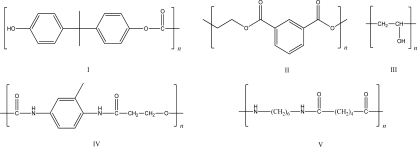
A)I
B)II
C)III
D)IV
E)V

A)I
B)II
C)III
D)IV
E)V
III
2
Which of the following polymers has the highest glass transition temperature (Tg)? 
A)I
B)II
C)III
D)IV
E)V

A)I
B)II
C)III
D)IV
E)V
IV
3
Which of the following is polyethylene? 
A)I
B)II
C)III
D)IV
E)V

A)I
B)II
C)III
D)IV
E)V
I
4
What is the product when the following molecule is treated with a polymerization catalyst (ROOR)? 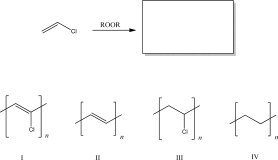
A)I
B)II
C)III
D)IV
E)A mixture of I and II

A)I
B)II
C)III
D)IV
E)A mixture of I and II

Unlock Deck
Unlock for access to all 51 flashcards in this deck.
Unlock Deck
k this deck
5
What starting material can be used to make the following polymer? 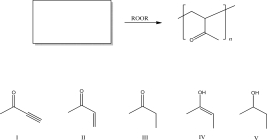
A)I
B)II
C)III
D)IV
E)V

A)I
B)II
C)III
D)IV
E)V

Unlock Deck
Unlock for access to all 51 flashcards in this deck.
Unlock Deck
k this deck
6
What is the repeating unit of the following polymer? 
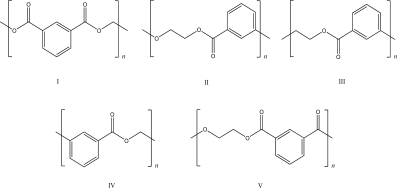
A)I
B)II
C)III
D)IV
E)V


A)I
B)II
C)III
D)IV
E)V

Unlock Deck
Unlock for access to all 51 flashcards in this deck.
Unlock Deck
k this deck
7
What is the product of the following cationic polymerization reaction? 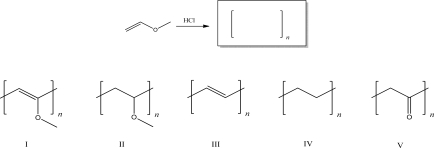
A)I
B)II
C)III
D)IV
E)V

A)I
B)II
C)III
D)IV
E)V

Unlock Deck
Unlock for access to all 51 flashcards in this deck.
Unlock Deck
k this deck
8
What is the repeating unit of the following polymer? 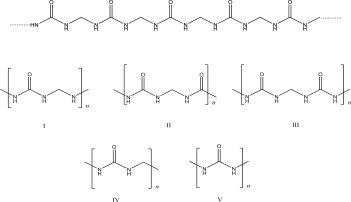
A)I
B)II
C)III
D)IV
E)V

A)I
B)II
C)III
D)IV
E)V

Unlock Deck
Unlock for access to all 51 flashcards in this deck.
Unlock Deck
k this deck
9
Which of the following polymers is the most water soluble? 
A)I
B)II
C)III
D)IV
E)V

A)I
B)II
C)III
D)IV
E)V

Unlock Deck
Unlock for access to all 51 flashcards in this deck.
Unlock Deck
k this deck
10
What type of reaction best describes the polymerization of the following monomers? 
A)Radical polymerization
B)Anionic polymerization
C)Cationic polymerization
D)Ring-opening polymerization
E)Step-growth polymerization

A)Radical polymerization
B)Anionic polymerization
C)Cationic polymerization
D)Ring-opening polymerization
E)Step-growth polymerization

Unlock Deck
Unlock for access to all 51 flashcards in this deck.
Unlock Deck
k this deck
11
Which of the following can be considered a polyamide? 
A)I
B)II
C)III
D)IV
E)V

A)I
B)II
C)III
D)IV
E)V

Unlock Deck
Unlock for access to all 51 flashcards in this deck.
Unlock Deck
k this deck
12
What monomer can be reacted with benzoyl peroxide in the presence of heat to produce polystyrene? 
A)I
B)II
C)III
D)IV
E)V

A)I
B)II
C)III
D)IV
E)V

Unlock Deck
Unlock for access to all 51 flashcards in this deck.
Unlock Deck
k this deck
13
What monomer can be reacted with benzoyl peroxide in the presence of heat to produce polyethylene? 
A)I
B)II
C)III
D)IV
E)V

A)I
B)II
C)III
D)IV
E)V

Unlock Deck
Unlock for access to all 51 flashcards in this deck.
Unlock Deck
k this deck
14
What is the repeating unit of the following polymer? 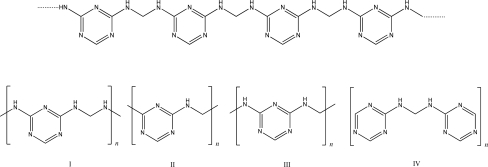
A)I
B)II
C)III
D)IV
E)None of these is the repeating unit.

A)I
B)II
C)III
D)IV
E)None of these is the repeating unit.

Unlock Deck
Unlock for access to all 51 flashcards in this deck.
Unlock Deck
k this deck
15
Which of the following can be considered a polyester? 
A)I
B)II
C)III
D)IV
E)V

A)I
B)II
C)III
D)IV
E)V

Unlock Deck
Unlock for access to all 51 flashcards in this deck.
Unlock Deck
k this deck
16
Which of the following monomers would react the slowest in an anionic polymerization initiated by the addition of butyl lithium? 
A)I
B)II
C)III
D)IV
E)V

A)I
B)II
C)III
D)IV
E)V

Unlock Deck
Unlock for access to all 51 flashcards in this deck.
Unlock Deck
k this deck
17
Which of the following monomers would undergo cationic polymerization at the fastest rate after treatment with acid? 
A)I
B)II
C)III
D)IV
E)V

A)I
B)II
C)III
D)IV
E)V

Unlock Deck
Unlock for access to all 51 flashcards in this deck.
Unlock Deck
k this deck
18
Which of the following polymers has the highest glass transition temperature (Tg)? 
A)I
B)II
C)III
D)IV
E)V

A)I
B)II
C)III
D)IV
E)V

Unlock Deck
Unlock for access to all 51 flashcards in this deck.
Unlock Deck
k this deck
19
What product results when the following molecule is treated with a polymerization catalyst (ROOR)? 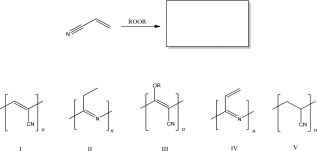
A)I
B)II
C)III
D)IV
E)V

A)I
B)II
C)III
D)IV
E)V

Unlock Deck
Unlock for access to all 51 flashcards in this deck.
Unlock Deck
k this deck
20
Which of the following can be classified as a copolymer? 
A)I
B)II
C)III
D)IV
E)None of these is a copolymer.

A)I
B)II
C)III
D)IV
E)None of these is a copolymer.

Unlock Deck
Unlock for access to all 51 flashcards in this deck.
Unlock Deck
k this deck
21
Give the repeating unit for the following polymer. 


Unlock Deck
Unlock for access to all 51 flashcards in this deck.
Unlock Deck
k this deck
22
Give the product of the following radical polymerization. 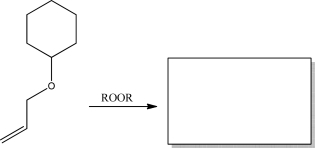


Unlock Deck
Unlock for access to all 51 flashcards in this deck.
Unlock Deck
k this deck
23
Which of the following polymers is the most water soluble? 
A)I
B)II
C)III
D)IV
E)V

A)I
B)II
C)III
D)IV
E)V

Unlock Deck
Unlock for access to all 51 flashcards in this deck.
Unlock Deck
k this deck
24
Give the product of the following radical polymerization. 


Unlock Deck
Unlock for access to all 51 flashcards in this deck.
Unlock Deck
k this deck
25
Give the repeating unit for the following polymer. 


Unlock Deck
Unlock for access to all 51 flashcards in this deck.
Unlock Deck
k this deck
26
Draw the mechanism for the following anionic polymerization.Include two propagation steps,and terminate the reaction using H3O+. 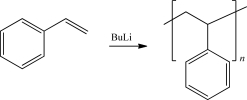


Unlock Deck
Unlock for access to all 51 flashcards in this deck.
Unlock Deck
k this deck
27
Which of the following results when protein subunits combine to form a larger structure?
A)Primary structure
B)Secondary structure
C)Tertiary structure
D)Quaternary structure
E)None of these
A)Primary structure
B)Secondary structure
C)Tertiary structure
D)Quaternary structure
E)None of these

Unlock Deck
Unlock for access to all 51 flashcards in this deck.
Unlock Deck
k this deck
28
Show the monomer needed to make polyvinyl chloride using radical polymerization.

Unlock Deck
Unlock for access to all 51 flashcards in this deck.
Unlock Deck
k this deck
29
Which of the following describes the location of all of a protein's atoms in three-dimensional space?
A)Primary structure
B)Secondary structure
C)Tertiary structure
D)Quaternary structure
E)None of these
A)Primary structure
B)Secondary structure
C)Tertiary structure
D)Quaternary structure
E)None of these

Unlock Deck
Unlock for access to all 51 flashcards in this deck.
Unlock Deck
k this deck
30
The main chain glucose units in amylose are connected by which type of glycosidic linkages?
A)α-1,4'-glycosidic linkages
B)α-1,6'-glycosidic linkages
C)β-1,4'-glycosidic linkages
D)β-1,5'-glycosidic linkages
E)β-1,6'-glycosidic linkages
A)α-1,4'-glycosidic linkages
B)α-1,6'-glycosidic linkages
C)β-1,4'-glycosidic linkages
D)β-1,5'-glycosidic linkages
E)β-1,6'-glycosidic linkages

Unlock Deck
Unlock for access to all 51 flashcards in this deck.
Unlock Deck
k this deck
31
Identify the class of the following polymer based on its functional group. 


Unlock Deck
Unlock for access to all 51 flashcards in this deck.
Unlock Deck
k this deck
32
Give the product and mechanism for the following polymerization reaction.Include initiation,termination,and two propagation steps. 


Unlock Deck
Unlock for access to all 51 flashcards in this deck.
Unlock Deck
k this deck
33
What is the product of the following step-growth polymerization? 


Unlock Deck
Unlock for access to all 51 flashcards in this deck.
Unlock Deck
k this deck
34
What is the name of the following polymer? 


Unlock Deck
Unlock for access to all 51 flashcards in this deck.
Unlock Deck
k this deck
35
Give the repeating unit for the following polymer. 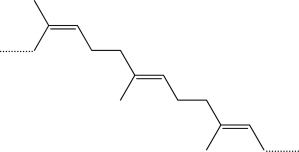


Unlock Deck
Unlock for access to all 51 flashcards in this deck.
Unlock Deck
k this deck
36
What is the name of the following polymer? 


Unlock Deck
Unlock for access to all 51 flashcards in this deck.
Unlock Deck
k this deck
37
Polymers that are formed by two different types of monomers polymerizing together are called ________.

Unlock Deck
Unlock for access to all 51 flashcards in this deck.
Unlock Deck
k this deck
38
Identify the class of the following polymer based on its functional group. 


Unlock Deck
Unlock for access to all 51 flashcards in this deck.
Unlock Deck
k this deck
39
Show the monomer needed to make polystyrene using radical polymerization.

Unlock Deck
Unlock for access to all 51 flashcards in this deck.
Unlock Deck
k this deck
40
An -helix is an example of which type of protein structure?
A)Primary structure
B)Secondary structure
C)Tertiary structure
D)Quaternary structure
E)None of these
A)Primary structure
B)Secondary structure
C)Tertiary structure
D)Quaternary structure
E)None of these

Unlock Deck
Unlock for access to all 51 flashcards in this deck.
Unlock Deck
k this deck
41
Draw the mechanism and give the product for the following anionic polymerization.Include two propagation steps,and terminate the reaction using H3O+. 


Unlock Deck
Unlock for access to all 51 flashcards in this deck.
Unlock Deck
k this deck
42
What staring material is required for the following anionic ring-opening polymerization? 


Unlock Deck
Unlock for access to all 51 flashcards in this deck.
Unlock Deck
k this deck
43
Give the mechanism and product for the following chain growth polymerization.Include two cycles of propagation. 


Unlock Deck
Unlock for access to all 51 flashcards in this deck.
Unlock Deck
k this deck
44
Which of the following polymers has the lowest melting point (Tm)? 


Unlock Deck
Unlock for access to all 51 flashcards in this deck.
Unlock Deck
k this deck
45
Draw two cysteines linked by a disulfide bond.

Unlock Deck
Unlock for access to all 51 flashcards in this deck.
Unlock Deck
k this deck
46
Which of the following polymers has the highest glass transition temperature (Tg)? 


Unlock Deck
Unlock for access to all 51 flashcards in this deck.
Unlock Deck
k this deck
47
Explain why humans can digest amalose but not cellulose.

Unlock Deck
Unlock for access to all 51 flashcards in this deck.
Unlock Deck
k this deck
48
Which of the following polymers is more water soluble? 


Unlock Deck
Unlock for access to all 51 flashcards in this deck.
Unlock Deck
k this deck
49
What is the structural difference between amylopectin and amalose?

Unlock Deck
Unlock for access to all 51 flashcards in this deck.
Unlock Deck
k this deck
50
What are the two most common types of secondary structure?

Unlock Deck
Unlock for access to all 51 flashcards in this deck.
Unlock Deck
k this deck
51
Draw the mechanism and give the product for the following cationic polymerization.Include two propagation steps,and terminate the reaction using hydroxide. 


Unlock Deck
Unlock for access to all 51 flashcards in this deck.
Unlock Deck
k this deck


